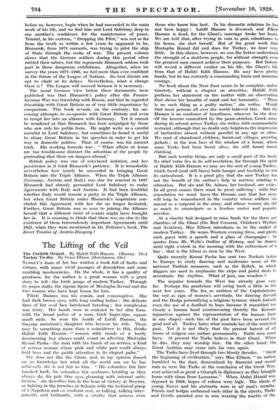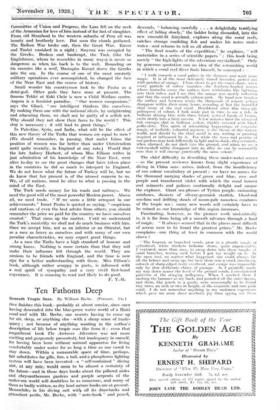The Lifting of the Veil
TURKEY'S Joan of Arc has written a book full of faults and virtues, with many vivid passages of description and some rambling incoherencies. On the whole, it has a quality of greatness, for the author is a great woman with a great story to tell—the birth pangs of modern Turkey. Through its pages stalks the tigrine figure of Mustapha Kemal and the two women who have kept house for him.
Fikrie Hanum was his cousin, and consumptive: She had dark brown- eyes, with long curling lashes : the delicate lines of her oval face betokened breeding ; her complexion was ivory. Her hands were in contrast to her slim form, with the broad palms of a man, thick finger-tipS, square' small nails. So were the hands of Latife Harium, the - Smyrna merchant's daughter who beemic his wife. There may be something more than a coincidence. in this, thinks Halide Edib Hantirri—" women with hands- of a hardy domineering boy always could count on affecting' Mustapha Kemal Pasha—the' man with the hands of an actress, a kind of actress woman whose pink and white 'paw could always' hold lives and the public' attention in its elegant pahn."_ .She does not like the Ghazi, and, in my opinion (based on no knowledge but what all the world can see he :has achieved), she is not fait to him. "His colourless fair hair brushed back, his colourless fair eyebrows bristling as they always do, his pale blue eyes gleaming with internal satis-
faction," she describes him in the hour of victory at Smyrna, or fighting in the trenches at Sakaria with the technical grasp of a Napoleon and r.0 exultant zest, or talking, talking inter- pinably and brilliantly,. with a vitality that amazes 'en those who know him best. In his domestic relations he has not been happy : Latife Hanum is divorced, and Fikrie Hantun is dead, for the Ghazi's marriage broke her heart.
We are told that, after trying in vain to gain admittance to his house, she shot herself. But of the great work that
Mustapha Kemal did and does for Turkey, we hear very little. In this silence, however, we can the better understand the strength of a stubborn people, for without strength even the greatest men cannot achieve their purposes. But history will record a different verdict on his life, the Gimes life from that of Halide Edib Hanum. He may have pretty hands, but he has certainly a commanding brain and immense courage.
No book about the Near East seems to be complete, unfor- tunately, without a chapter on atrocities. Halide Edib prefaces her statement on the matter with an observation that shows her breadth of mind and her humanity. "There is no such thing as a guilty nation," she writes. Would that more persons all over the world believed this. But the Hanum is no condoner of beastliness, whoever be the doer. Of the horrors committed by the panic-stricken Greek army during its retreat across Turkey she writes with commendable restraint, although that no doubt only heightens the impression of barbarities almost without parallel in any age or clime.
We read of abandoned children, burnt-out villages; prowling jackals: in the iron bars of the window of a house, where some Turks had been burnt alive, she still found hands clutching.
But such terrible things are only a small part of the book. Its chief value lies in its self-revelation, for through the spirit of Halide Edib Hanum we may see the soul of young Turkey, which faced (and still faces) both hunger and hardship to win its nationhood. It is a great pity that the new Turkey has not the benefit of the author's help in matters relating to education. But she and Dr. Adnan, her husband, are exiles. In all great causes there must be great suffering : with that consolation we must leave the Hanum, sure that her story will long be remembered in the country whose soldiers she nursed as a corporal in the army, and whose women she did so much to emancipate as a fearless orator and populai novelist.
At a charity ball designed to raise funds for the three pet charities of the Ghazi (the Red Crescent, Children's Welfare and Aviation), Miss Ellison introduces us to the maker of modern Turkey. He wears Western evening dress, and greets each guest with a speech and a glass of champagne : he
quotes from Mr. Wells's Outline of History, and he dances until eight o'clock in the morning with the enthusiasm of a boy : that is the Ghazi as seen by the West.
Quite recently Kemal Pasha has sent two Turkish ladies to Europe to study dancing and modernize some of the national Turkish measures, such as the Zeibek, in which daggers are used to emphasize the steps and pistol shots to accentuate the rhythm. What of jazz, one wonders?
The impulse towards the West has already gone very far. Perhaps the pendulum will swing back a little in the next few years. The fez, as emblem of the Capitulations, the veil as sign of women's servitude, the dancing dervish and the Hodja personifying a religious tyranny which forbade even the me of a football to boys because it resembled too closely a human head (contravening thereby the Koranic injunction against the representation of the human form in any shape)—such ties of the past have been severed for good and all. Turkey hates what reminds her of the wretched past. Yet it is not likely that the present hatred of all forms of religion can endure permanently. Faith men must have. At present the Turks believe in their Ghazi. When he dies, they may worship him. On the other hand, the Great Arabian may come into his own again.
The Turks have lived through two bloody decades. "Since the beginning of civilization," says Miss Ellison, ." no nation humbled to the dust, demoralized by financial and moral ruin as were the Turks at the conclusion of the Great War, ever achieved so great a triumph in diplomacy as they brought home with them from Lausanne." When Abdul Hamid was deposed in 1908, lopes of reform were high. The ideals of young Enver and his stalwarts were in all men's mouths. Priests and hodjas embraced each other in the streets, nuke and Greeks paraded arm in arm wearing the rosette of the Committee of Union. and Progress, the Lazz fell on the neck of the Armenian fOr love °thim instead of for lust of slaughter. From old. Stamboul to the western, suburbs of .Pera all was beauty and brotherly love. But soon the clouds gathered. The Balkan War broke out, then the Great War. Enver and .i.faalat vanished in a night; Smyrna" was occupied by the Oreels,., Broken and bankrupt,_ the Turk (like the Englishman, whom he resemhles. in many ways) is never so dangerous as when his _hack is to the . wall, Rounding on his enemies like a wolf, Mustapha Kemal drove the Greeks_ into the S. In the .course of one, of the most masterly military operations ever accomplished, he changed the face of the Near East and the course of history.
Small: wonder his countrymen look to the Pasha as a demi-god., Other gods they have none at present. The famous Tekke at Eski. Char is now a Child Welfare. centre. Angora is a feminist paradise.. "Our women companions," says the Ghazi, `` are intelligent thinkers like ourselves. By making them one with the national ideals, by enlightening and educating them, we shall not be guilty of a selfish act. Why should they not show their faces to the world ? This step is necessary ; it will . lead to great things."
In Palestine, Syria, and India, what will be the effect of this new theory of the Turks that women are equal to men ? (We should remember, in passing, that under Islam the position of women was far better than under Christendom until quite recently, in England at any rate.) Would that the late Aubrey Herbert, of whom Miss Ellison writes in just admiration of his knowledie of the Near East, were alive to-day to see the great changes that have taken place in the countries he did so much to interpret to England. We do not know what the future of Turkey will be, but we do know that her present is . of the utmost concern to us. We, of all nations, must be alive to what is passing in the mind of the East. . The Turk needs money for his roads and railways. We need.the good will of the most powerful Moslem power. Above all, we need trade.. "If we seem a little arrogant in our achievements," Ismet Pasha is quoted as saying, "suspicious and cautious of even the best advice from others, you should remember the price we paid for the country we have ourselves created." That sums up the matter. Until we understand the Turk's. mentality we shall not do much .business with him. - Once we accept him, not as an inferior or an Oriental, but as a race as brave. as ourselves and with many of our own peculiar characteristics, we may expect great things.
_As. a race the Turks have a high standard of honour and strong knees. Nothing is more certain than that they will make . their influence felt through the world. They are anxious to be friends with England, and the time is now ripe for a better understanding with them. Miss Ellison's book, although rather scrappy in parts, is inforined with a real spirit of sympathy and a very vivid first-band experience: It is amusing to read and likely to do good.
F. Y.-B.













































 Previous page
Previous page